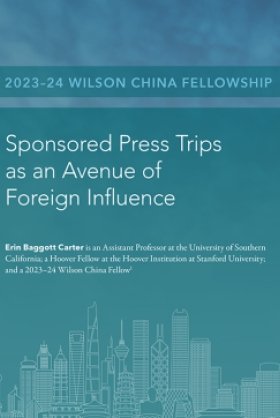Sponsored Press Trips as an Avenue of Foreign Influence



Shaping American discourse about China is an increasingly important objective for Beijing. Beijing does so, in part, by bringing American journalists to China. I identified the dates and participants for every sponsored media trip to China between 2011 and 2018 disclosed by the lobbying firms that helped organize them in the Foreign Agents Registration Act (FARA) archive. Beijing schedules these trips, I find, when international media coverage is typically most damaging to the CCP: the anniversary of the Tiananmen massacre; the annual meeting of the rubber-stamp National People’s Congress; and diplomatic crises, among others. Using tools from computational linguistics, I show that these trips shape subsequent coverage, even in America’s newspapers of record. Participating media outlets depicted China’s rise as less threatening and pivoted from Beijing’s long record of human rights violations to its openness to economic cooperation with Washington. Over time, this essay suggests, Beijing’s media outreach strategy may render Americans more comfortable with its bid for global leadership.


The Kissinger Institute works to ensure that China policy serves American long-term interests and is founded in understanding of historical and cultural factors in bilateral relations and in accurate assessment of the aspirations of China’s government and people. Read more


